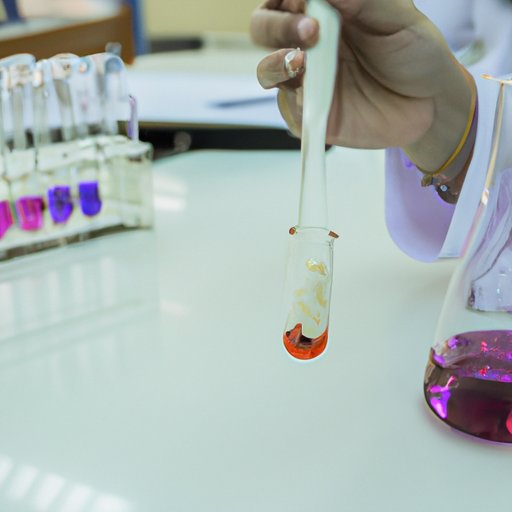Introduction
In scientific experiments, a variable is an element that can be manipulated, measured, or changed in some way. Variables are used to determine the effect of one thing on another and to test hypotheses. In order to accurately measure the effects of variables, they must be carefully controlled. This article will explore the basics of variables in science experiments, the different types of variables used in experiments, and how to control variables for accurate results.

Exploring the Basics of Variables in Science Experiments
Variables play an important role in scientific experiments and can have a significant impact on the results. The first step in understanding how variables work is to identify the different types of variables used in experiments. There are two main types of variables: independent variables and dependent variables. Independent variables are those that are manipulated by the researcher. These are the variables that the researcher wants to measure in order to test a hypothesis. Dependent variables are those that are affected by the manipulation of the independent variable. These are the variables that the researcher wants to measure in order to observe the effects of the independent variable.
The impact of variables on scientific research cannot be overstated. By manipulating variables, researchers can determine how different factors affect each other. For example, a researcher may want to know how temperature affects the growth of plants. In this case, the researcher would manipulate the temperature (the independent variable) and measure the growth of the plants (the dependent variable). By doing this, the researcher can determine how different temperatures affect plant growth.
Controlling Variables in Experiments for Accurate Results
In order to get accurate results from scientific experiments, it is important to control the variables. This means that all other factors should remain constant so that the only factor being tested is the independent variable. If there are other factors that could influence the results, then these must be taken into account and controlled. For example, if the researcher wants to test the effect of temperature on plant growth, then the amount of water and sunlight given to the plants must remain the same throughout the experiment.
Analyzing the effects of changing variables on results is an important part of scientific experimentation. Researchers need to be aware of how their manipulation of variables affects the results they are observing. For example, if the researcher changes the temperature of the plants but fails to change the amount of water and sunlight given to the plants, then the results of the experiment may not be accurate. As such, it is important to take into account all the variables that could potentially affect the results.
Understanding the role of variables in scientific inquiry is essential for successful experiments. By manipulating and controlling variables, researchers can gain insights into the relationships between different factors and make predictions about how these factors interact. This knowledge can be used to develop new theories or improve existing ones. Furthermore, by controlling variables, researchers can ensure that their experiments are reliable and valid.
Conclusion
In conclusion, variables play an important role in scientific experiments. They are elements that can be manipulated, measured, or changed in some way. There are two main types of variables: independent variables and dependent variables. Independent variables are those that are manipulated by the researcher, while dependent variables are those that are affected by the manipulation of the independent variable. It is important to control variables in order to get accurate results from scientific experiments. Analyzing the effects of changing variables on results is essential for successful experiments, as is understanding the role of variables in scientific inquiry. By manipulating and controlling variables, researchers can gain insight into the relationships between different factors and make predictions about how these factors interact.
(Note: Is this article not meeting your expectations? Do you have knowledge or insights to share? Unlock new opportunities and expand your reach by joining our authors team. Click Registration to join us and share your expertise with our readers.)
